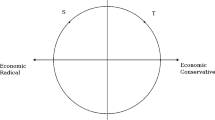Abstract
Consider an abstract political economy which has a collective choice rule together with strategic interactions among players. We prove that there exists an equilibrium in such an economy by synthesizing an equilibrium existence theorem in generalized games by Shafer and Sonnenschein (1975) and a voting core existence theorem in simple games by Schofield (1984, 1989). The theorem can be applied to a public good economy where public good provisions are determined by a class of voting rule.
Similar content being viewed by others
References
Austen-Smith D, Banks J (1995) Positive Political Theory. University of Michigan Press (in press)
Bergstrom TC (1976) How to discard ‘free disposability’ — at no cost. J Math Econ 3: 131–134
Denzau AT, Parks RP (1983) Existence of voting market equilibria. J Econ Theory 30: 243–265
Foley DK (1967) Resource allocation and the public sector. Yale Economic Essays 7: 43–98
Gale D, Mas-Colell A (1975) An equilibrium existence theorem for a general model without ordered preferences. J Math Econ 2: 9–15
Greenberg J (1977a) Quasi-equilibrium in abstract economies without ordered preferences. J Math Econ 4: 163–165
Greenberg J (1977b) Existence of an equilibrium with arbitrary tax schemes for financing local public goods. J. Econ Theory 16: 137–150
Greenberg J (1979) Consistent majority rules over compact sets of alternatives. Econometrica 47: 627–636
Greenberg J, Shitovitz B (1988) Consistent voting rules for competitive local public good economies. J Econ Theory 46: 223–236
Konishi H (1995) Voting with ballots and feet: existence of equilibrium in a local public good economy. J Econ Theory (in press)
Nakamura K (1979) The vetoers in a simple game with ordinal preferences. Int J Game Theory 8: 55–61
Roberts KWS (1977) Voting over income tax schedules. J Public Econ 8: 329–340
Schofield N (1984) Social equilibrium and cycles on compact sets. J Econ Theory 33: 59–71
Schofield N (1989) Smooth social choice. Math. Computer Modeling 12: 417–435
Shafer W (1976) Equilibrium in economies without ordered preferences of free disposal. J Math Econ 3: 135–137
Shafer W, Sonnenschein H (1975) Equilibrium in abstract economies without ordered preferences. J Math Econ 2: 345–348
Slutsky S (1977) A voting model for the allocation of public goods: existence of an equilibrium. J Econ Theory 14: 299–325
Sonnenschein H (1971) Demand theory without transitive preferences, with applications the theory of competitive equilibrium. In Chipman J et al (eds) Preference, Utility, and Demand. Harcourt Brace Jovanovich, New York
Author information
Authors and Affiliations
Additional information
Thanks are due to David Austen-Smith, Jeffrey Banks, Marcus Berliant, Steve Ching, Ryo-Ichi Nagahisa, Mary Beth Savio, Norman Schofield, and Tomoichi Shinotsuka. Detailed comments from an anonymous referee of the journal are gratefully acknowledged. Errors are, of course, my own.
Rights and permissions
About this article
Cite this article
Konishi, H. Equilibrium in abstract political economies: with an application to a public good economy with voting. Soc Choice Welfare 13, 43–50 (1996). https://doi.org/10.1007/BF00179097
Received:
Accepted:
Issue Date:
DOI: https://doi.org/10.1007/BF00179097




